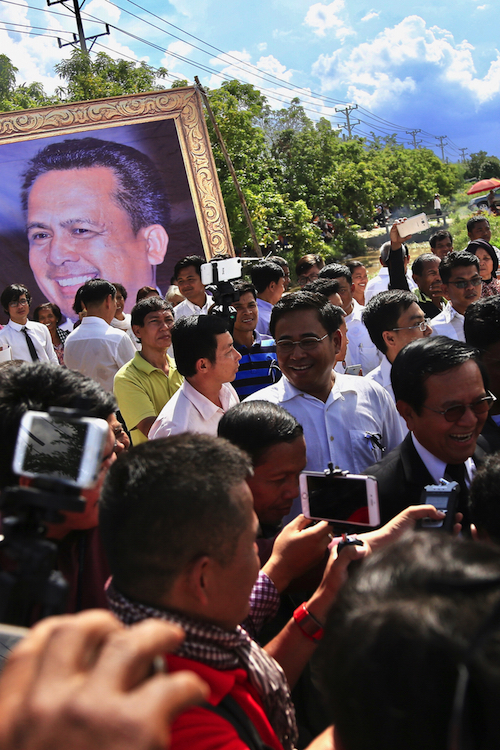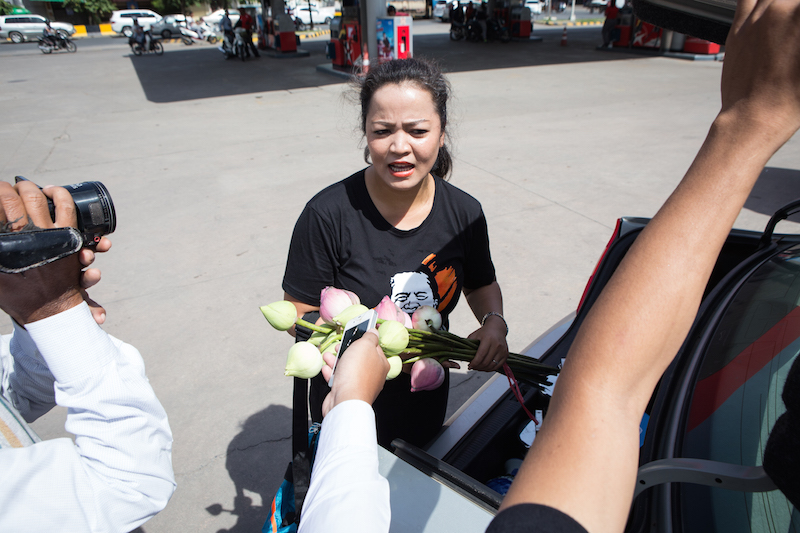In late June last year, Cham Bunthet was having one of his regular catch-ups with fellow political analyst Kem Ley at a cafe in central Phnom Penh when his friend delivered an ominous warning.
“That time, I brought my daughter with me, and we were meeting in a small room while my daughter was just sitting on a small chair outside with potato chips,” Mr. Bunthet said in a Norodom Boulevard cafe on Tuesday.

“After we finished the meeting, my daughter slept on the table and he told me: ‘Thet, our lives are on the red line. We can be shot down and dead any time. Don’t bring our children with us because they will be very shocked to see if there’s an attack on us.’”
Two weeks later, Kem Ley was gunned down on a sleepy Sunday morning inside a Star Mart about a kilometer away.
The murder sent shockwaves through the nation, with many perceiving it as a depressing return to politically motivated slayings of the past. The ensuing investigation only heightened suspicions among many Cambodians that it had been a political hit against arguably the country’s most prominent political analyst, intended to send a message to outspoken critics: Don’t overstep the mark.
Mr. Bunthet—whose profile has grown since the death of Kem Ley—said he believed the murder had impacted political discourse and analysis over the past year, in both positive and negative ways.
While some analysts have seemingly taken steps away from the media limelight, Mr. Bunthet said the next generation of analysts—including those Kem Ley was training before his death—had become emboldened.
“I like these young people, Kem Ley’s students, because what they are saying is not what people want to hear, but they tell people: ‘This is what you need to hear,” he said.
“For example, the solutions, the talks between the top leaders, not insulting the government individually but talking more about what are the human rights violations that need to be fixed. What are the economic issues? What kind of jobs do people need? What kind of election can be free and fair?”
Often overlooked issues such as LGBT and women’s rights were also now receiving a hearing, he said.

One of those analysts who has stepped up to the plate since his mentor’s murder is Hang Vitou, the director of the Young Analysts Group, a consortium of budding political commentators. Mr. Vitou’s analytical skills were nurtured by Kem Ley after they met in Bangkok in 2013.
While some in the group faded into the shadows after Kem Ley’s death, Mr. Vitou said he was determined to continue the work of his mentor. His voice is now regularly heard on radio airwaves and journalists are increasingly turning to him for opinions on the day’s issues.
“I think many people, and some of his students, have now stopped talking or speaking on the radio programs because they are afraid of murder or something that can threaten them, but a few of us still continue our work,” Mr. Vitou said.
However, the 27-year-old accepted that there were times he needed to “calm” his rhetoric, claiming that he was under regular surveillance.
“We have noticed that we see the same person follow us when we go somewhere and do something. They always know what we are going to do. It’s hard to explain,” Mr. Vitou said.
Mr. Vitou insisted he would push ahead, despite the risks and his family’s protestations.
“My parents always request that I stop this work and they always demand me to go abroad, go to Thailand, go to countries other than Cambodia, because they feel that our group is not safe and I, myself, am not safe,” he said.
“But I think that if we go and we leave all this work alone, then Dr. Kem Ley’s mission will stop. So there is only one way we can continue our journey.”
Sophal Ear, a policy analyst and associate professor of Diplomacy & World Affairs at Occidental College in Los Angeles, said Kem Ley’s murder had undoubtedly had a chilling effect on dissenting voices, but that it would only serve to inspire the next generation of intellectuals to step into his shoes.
“Kem Ley’s death led to an outpouring of emotion and possibly the largest public funeral procession Cambodia has ever seen. He became instantly lionized and martyred. At the same time, paradoxically, it’s also had an incredibly chilling effect on political discourse in Cambodia,” Mr. Ear wrote in an email.
“The message was crystal clear: political outspokenness and education can be hazardous to your health,” he said.
“But of course, like Martin Luther King Jr., Kem Ley’s death will only serve to ignite the embers of justice. His death will create an entire generation of Kem Leys. They may be quiet now, but their minds cannot be pacified.”
Council of Ministers spokesman Phay Siphan dismissed ongoing allegations from human rights groups and the wider public that the government was involved in the commentator’s assassination.
“Who gets the benefit from Kem Ley’s death? Not the government, not the city,” he said.
“For sure, they’re going to put the blame on us. That’s why the government keeps looking for who was behind that,” he said. The murder case was still open, he added.
Mr. Siphan said other political analysts need not be afraid to criticize the government, as criticism was part of an “open society.”
“They can say anything—it’s a manner of open society,” he said, adding that the government could shut down the foreign-owned press if they were so averse to criticism “but we don’t do that—we learn from that and move on.”
“We are still so sorry about Mr. Kem Ley’s death. It is so sad,” he said.
Political analyst Meas Nee admitted that Kem Ley’s murder, and the arrest of government critic Kim Sok for apparently blaming the death on the government, had left him contemplating his outspoken criticism of the government.
“After the death of Kem Ley, but also the imprisonment of another political analyst, Kim Sok, I found myself running somewhere between whether I should go ahead or whether I should withdraw,” Mr. Nee said. Eventually, he decided to continue his work, but made a concerted effort to be cautious with his words.
“I try to look for ways to either criticize both sides or not mention their names directly—not the names of the CPP or CNRP,” Mr. Nee said.
“But most of the time when talking about party leadership—although sometimes I need to refer to the ruling party—I do not mention the word ‘ruling’ because they can [send] me through the court or have a lawsuit against me any time.”
Mr. Nee’s anxieties were only made worse when Prime Minister Hun Sen warned him to “not go too far” in February after he made the observation that a CPP legislative maneuver banning the CNRP from summoning ministers was unconstitutional.
“When you look at the Kem Ley killing, and also other past murders of social activists or environmental activists, I have all sort of reasons to be scared and to be careful all the time,” he said.
Future Forum think tank founder Ou Virak, who faced a defamation complaint from the CPP in April last year for suggesting that the ruling party was using a sex scandal involving then-CNRP Vice President Kem Sokha as a means to damage the political opposition, also admitted to watching his words.
“You’re a bit more cautious and you have to pay a bit more attention to every single word you say, although I’m always trying to stick to what is known,” Mr. Virak said.
“You just don’t know what statement of opinion will be interpreted as a statement of fact, which is much more difficult because when you’re actually doing analysis you will go on your opinion, and repeat: ‘This is my opinion, this is my opinion,’” he added.
“But it is one of those things. How often do you need to say that before you sound ridiculous? That’s the challenge of talking about politics in an environment like Cambodia.”
Being careful with one’s words came with the territory of criticizing the powerful anywhere, Mr. Bunthet said.
“When you push them over the limit, they will punch your nose, they will kill you, they will destroy you and that’s their nature,” he said, claiming he was referring to “the nature of human beings in general” when asked to whom he was referring.
“Why? Because they are fearful. They fear losing power, fear losing their personal security. That’s the reason why they kill us. So make sure they trust you, that we are not [trying to] destroy them but trying to help them,” he said.
Mr. Bunthet admitted he and his family fear he might meet his end in the same way as his friend a year ago today, but said it would not stop him speaking out against injustices.
“To say I am not fearful of being shot, I would be lying,” he said.
“But for me, between choosing to keep silent and then living in this kind of oppressive society until I die, or choosing to speak out and die—I would choose to speak out and die.”
(Additional reporting by Hannah Hawkins)



